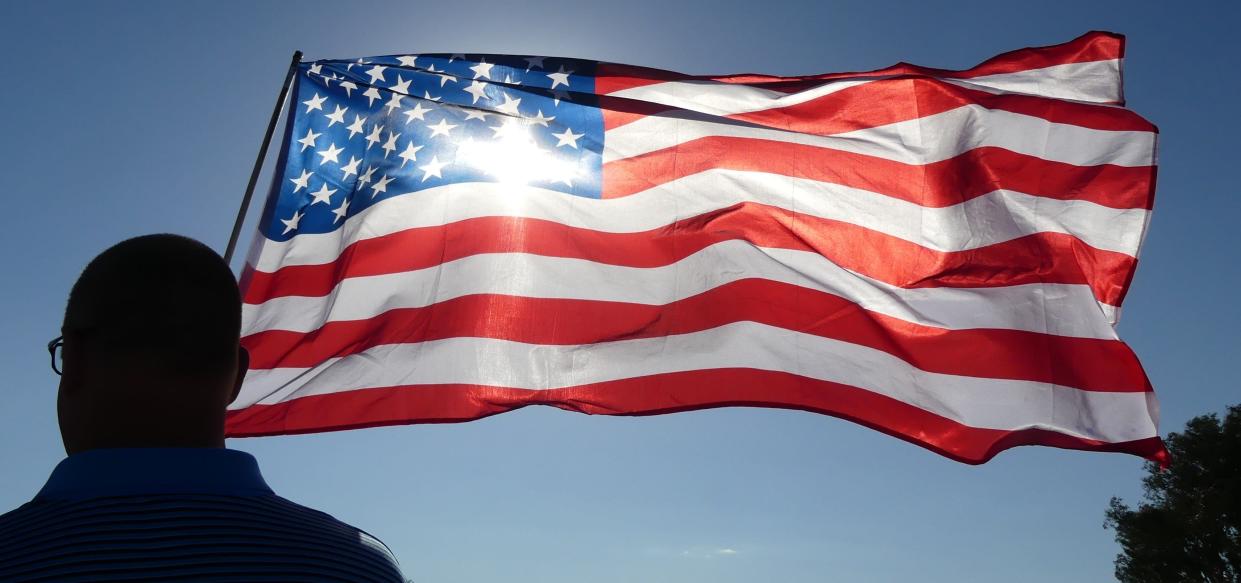One of Kennedy's Kids asks: How true are the ideals symbolic to the Fourth of July?

- Oops!Something went wrong.Please try again later.
“We hold these truths to be self-evident, that all men are created equal, that they are endowed by their Creator with certain unalienable Rights, that among these are Life, Liberty and the pursuit of Happiness.”
A quarter of a millennium has run its course since those words were enshrined on parchment in America’s founding text. A declaration known to every American school kid.
In 1973, I pondered those words as I crossed America on the Fourth of July. Fresh out of the college, I was headed to Africa with a dream, a dream imparted to me and other Peace Corps volunteers bound for Senegal. We were “Kennedy’s Kids,” toiling in a foreign land, teaching, digging wells, working in health care and forestry and farming, living modestly on a volunteer’s stipend.
We answered President John F. Kennedy’s call against the grain of rationality, while fellow graduates went off to Wall Street and Madison Avenue. We believed in service to our country. We believed that we could nurture human lives on a human scale.
Senegal has demonstrated relative political stability and freedom since independence in 1960. Yet, that fact belies the dark history of a land that has contributed so much to the making and unmaking of America. A shared history, which intersects with America and the Declaration of Independence.
Off shore of the bustling capital of Dakar, where Senegal meets the sea, lays Gorée Island with a house with a hole in the wall with a splendid view of Atlantic sunsets. That hole in the wall is known as the Door of No Return in a house called the House of Slaves. It looks out toward the New World, a world that shared complicity with captains and stockholders of ships that sailed with lives stuffed like sardines into wooden holds bound for America.
Whether or not the House of Slaves served as a keep for those taken forcibly and sold as slaves is of some dispute. And immaterial. The house is a powerful symbol for a place that served as a point of no return for capitalism’s slave labor, slaves who were sold by the boatload on America’s shores, people deemed unequal in 1776 America, whose progeny counted as three-fifths of a human being in 1787 in our Constitution and people whose descendants numbered nearly 4 million when a war was waged over their freedom.
We went off to Peace Corps in the wake of an era of renewed struggle for equality by descendants of slaves in a nation scarred by separate and unequal. Stained by Jim Crow. Our adolescence bore witness to lunch counter sit-ins and police dog attacks, freedom marches and firehosings. We watched the brutality in Birmingham and Selma. We watched cities burn: 1965, Watts; 1967, Detroit; 1968, the assassination of Rev. Martin Luther King, Jr. unleashing clouds of smoke in Washington, D.C., Kansas City, Baltimore, Chicago.
All of this, in a nation of all men are created equal. A nation burning.
We went to Senegal with our hands and hearts in response to JFK’s eloquent ask not. We came home to a nation (still now) ill-at-ease with its melting pot of races. We came home to a nation more alien to us than the one in which we served.
We came home having learned that life’s riches are measured in unhurried conversations under a baobab tree with people whose skin looks unlike our own, in the communal reach of hands into a bowl of fish and rice, in the weight of a pail of water perched on a head from a well that supplies an entire village, in rows of desks where students – our students – wait intently for the miracle of formulating a phrase in English. We came home sharing a common humanity with the descendants of families torn asunder by the evil of the slave trade.
We were just 40-some ordinary American kids who dreamed we could make the world an extraordinary place. This Fourth of July, we are still uneasy with the progress made towards Jefferson’s self-evident truths.
Now in our 70s, we RPCVs (Returned Peace Corps Volunteers) of Senegal ’73-’75 meditate upon our mortality and the world we will leave our children and grandchildren. But as long we live and hold dear our youthful irrationality, we will never give up on our pursuit of life, liberty and happiness for all.
Timothy Rake is a retired French immersion teacher at South Eugene High School. He lives in Forest Grove.
This article originally appeared on Register-Guard: Kennedy Kid reflects on the ideals symbolic to 4th of July
